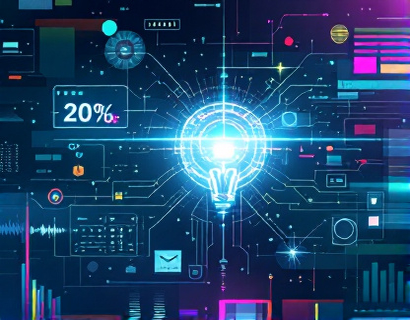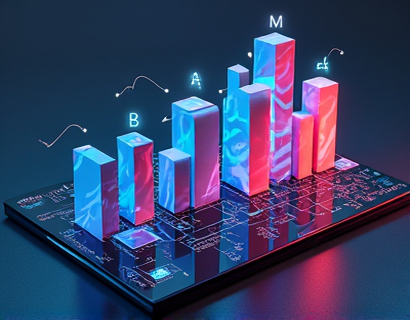Revolutionizing Digital Engagement: The Synergy of Crypto and AI
The intersection of cryptocurrency and artificial intelligence (AI) is ushering in a new era of digital engagement, where innovative tech solutions are redefining user experiences and enhancing connectivity. This fusion is not just a technological curiosity but a powerful force driving growth and interaction in the digital age. As we explore this dynamic landscape, it becomes evident that the combination of blockchain's decentralized nature and AI's computational prowess is creating unprecedented opportunities for users and businesses alike.
Understanding the Basics: Crypto and AI
To fully appreciate the impact of crypto and AI on digital engagement, it's essential to understand the fundamentals of both technologies. Cryptocurrency, often referred to as digital or virtual currency, operates on a decentralized network known as a blockchain. This technology ensures transparency, security, and immutability, making it an ideal foundation for various applications beyond mere transactions.
Artificial intelligence, on the other hand, encompasses a range of technologies designed to simulate human intelligence processes such as learning, reasoning, and self-correction. AI algorithms can analyze vast amounts of data, identify patterns, and make predictions or decisions with minimal human intervention. When these two technologies converge, the potential for innovation becomes immense.
The Transformative Impact on Digital Engagement
The integration of crypto and AI is transforming digital engagement by offering more secure, transparent, and personalized experiences. One of the key areas where this synergy is making a significant impact is in user authentication and identity management. Traditional methods often rely on centralized databases, which are vulnerable to breaches and fraud. By leveraging blockchain, user identities can be securely stored and verified, reducing the risk of unauthorized access and enhancing trust.
AI enhances this process by enabling advanced biometric authentication and behavioral analysis. For instance, machine learning algorithms can detect anomalies in user behavior, flagging potential security threats in real-time. This dual approach not only secures user data but also streamlines the authentication process, making it more efficient and user-friendly.
Enhanced Connectivity Through Decentralized Networks
Decentralized networks powered by blockchain technology are redefining how users connect and interact online. Unlike traditional centralized platforms, decentralized networks distribute data across multiple nodes, eliminating single points of failure and reducing censorship risks. This architecture fosters a more open and inclusive digital environment.
AI plays a crucial role in optimizing these networks. By analyzing network traffic and user behavior, AI can dynamically adjust resource allocation, ensuring optimal performance and minimal latency. Smart contracts, self-executing contracts with the terms directly written into code, further automate and streamline interactions, reducing the need for intermediaries and lowering transaction costs.
Personalized User Experiences
One of the most exciting applications of crypto and AI is in creating highly personalized user experiences. AI algorithms can analyze vast amounts of user data to understand preferences, behaviors, and needs. This insights-driven approach allows for tailored recommendations, content curation, and interactive experiences that resonate deeply with individual users.
In the context of cryptocurrency, this personalization extends to financial services. AI-driven financial advisors can provide customized investment strategies based on a user's risk tolerance, financial goals, and market conditions. Smart wallets and digital asset management platforms can automate transactions, track portfolio performance, and offer real-time insights, all while ensuring security and privacy.
Fraud Detection and Prevention
Fraud remains a significant concern in the digital realm, affecting both users and businesses. The combination of crypto and AI offers robust solutions to detect and prevent fraudulent activities. Machine learning models can analyze transaction patterns and identify suspicious activities with high accuracy, far surpassing the capabilities of traditional fraud detection systems.
Blockchain's transparency and immutability further enhance fraud prevention. Every transaction is recorded on a public ledger, making it difficult for fraudsters to manipulate data. AI can monitor these records in real-time, alerting authorities and platform administrators to potential fraud, thereby safeguarding user assets and maintaining trust in the system.
Innovative Business Models
The synergy of crypto and AI is also giving rise to innovative business models that disrupt traditional industries. Decentralized finance (DeFi) platforms, for example, leverage blockchain and AI to offer financial services such as lending, borrowing, and trading without intermediaries. These platforms use AI to assess creditworthiness, manage risks, and optimize trading strategies, making financial services more accessible and efficient.
In the realm of supply chain management, blockchain ensures transparency and traceability, while AI optimizes logistics and inventory management. This combination reduces costs, enhances efficiency, and improves customer satisfaction. Companies can track products from origin to destination, ensuring authenticity and quality, and AI can predict demand and adjust supply accordingly.
Challenges and Considerations
Despite the numerous benefits, the integration of crypto and AI is not without challenges. Regulatory uncertainties pose a significant hurdle, as governments worldwide grapple with how to govern these emerging technologies. Ensuring compliance while fostering innovation requires a balanced approach that addresses security, privacy, and ethical concerns.
Technical challenges also exist, such as scalability and interoperability. Blockchain networks need to handle increasing transaction volumes without compromising speed or security. AI models require substantial computational resources and high-quality data to function effectively. Addressing these technical hurdles is crucial for the widespread adoption of crypto and AI solutions.
The Future of Digital Engagement
As crypto and AI continue to evolve, their impact on digital engagement is poised to become even more profound. The next generation of tech solutions will likely see the integration of advanced AI techniques such as natural language processing and computer vision with blockchain technology. This could lead to more intuitive user interfaces, enhanced virtual and augmented reality experiences, and smarter, more autonomous systems.
The potential for decentralized applications (dApps) that combine the security of blockchain with the intelligence of AI is vast. These applications can revolutionize sectors such as healthcare, education, and entertainment, offering users unprecedented levels of control and personalization. The future is bright, with the fusion of crypto and AI paving the way for a more connected, secure, and user-centric digital world.










































